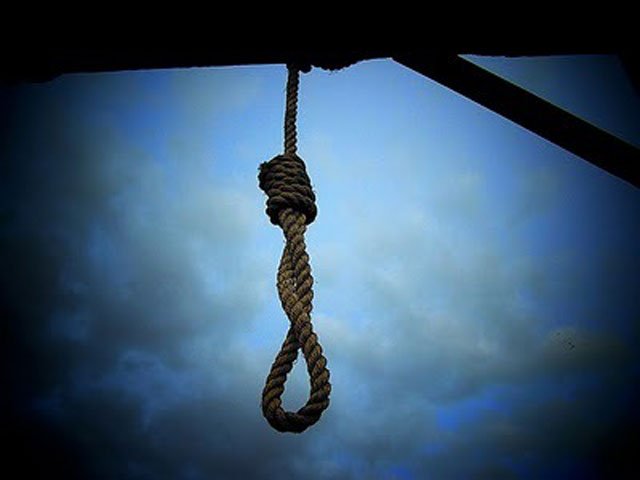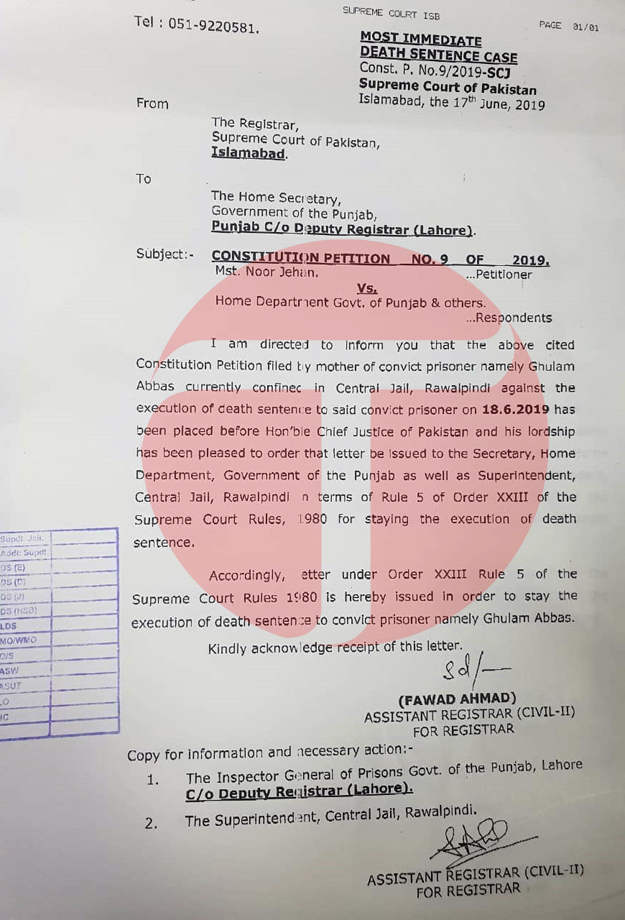
The constitution petition was moved by Noor Jahan, mother of Ghulam Abbas, under Article 184 (3) of the Constitution on Monday.
The order was issued on an application filed by the Justice Project Pakistan in the Supreme Court after the Punjab Home Department withdrew its permission to allow an independent psychiatrist and two government doctors to visit Adiala Jail and evaluate Abbas, who has spent 15 years in prison and was to be hanged on June 18.
The Punjab government’s move resulted in considerable distress for the family and the widowed mother of the convict. Abbas is her only surviving son.
Twists and turns pockmark lower court cases
It was only due to the untiring efforts of Federal Minister for Human Rights Shireen Mazari, Punjab MPA Ayesha Chaudhry and Parliamentary Secretary for Law and Justice Maleeka Bokhari that the Punjab government constituted a medical board that evaluated Abbas on Monday morning.
According to the doctors, the prisoner shows “strong evidence of epilepsy with reported episodes of fits within the jail”. They added that, “he has evidence of psychotic illness with hallucinations and behavioural disturbances” and also suffers from a “depressive illness and is on treatment in the jail since April 24, 2019”.
Moreover, there is an impression of mental retardation and he also suffers from ptosis of the right eye. The doctors recommended an MRI Brain with contrast, EEG and psychological assessment for IQ, adding that Abbas needs further assessment and treatment.
The execution of prisoners, who suffer from mental illness or psycho-social disabilities, is prohibited under international law. Jail psychiatrists who had been treating Abbas for the past six months, had not reviewed his family history and claimed that he was only suffering from mild depression even when he was prescribed Risperidone, a powerful antipsychotic drug.
A medical report of the condemned prisoner issued by the jail authorities as late as Friday also stated Abbas was not suffering from any mental illness. A preliminary examination of Abbas’ medical records by veteran psychiatrist Dr Malik Hussain Mubbashar, however, revealed a strong probability of psychosis and evidence of epilepsy.
Following uproar, CJP suspends mentally-ill prisoner's execution
This was eventually confirmed by the government-appointed medical board, comprising doctors from Benazir Bhutto Hospital, Rawalpindi – Prof Dr Asad Tamizuddin Nizami, Assistant Prof Dr Mehmood Ali Khan and Dr Muhammad Azeem Khan.
The convict’s execution, if carried out in haste, would have been a gross violation of human rights and a cruel and inhuman punishment. It serves no penal purpose to execute the mentally-ill and incapacitated. Importantly, it will be an egregious violation of Islamic law.
Imprisoned in 2004, Abbas was sentenced to death on May 31, 2006 by a District and Sessions Court for fatally stabbing a neighbour.
According to his family, he suffered from learning disability as a child, which resulted in him remaining completely uneducated and devoid of even basic primary schooling. Abbas’ father, who also suffered from mental illness, attempted suicide by slitting his throat but was fortunately saved. He never recovered and died a few months later. Abbas’s paternal aunt also suffer from mental illness and his sister has a neurological disorder requiring regular drainage of excess fluid from her brain.
Moreover, Abbas’s family claims that he has been suffering from Hepatitis and Tuberculosis (TB), but has yet to receive adequate treatment for it.




1722415155-0/BeFunky-collage-(18)1722415155-0-165x106.webp)
1717051338-0/BeFunky-collage-(76)1717051338-0-165x106.webp)
1732002687-0/Untitled-design-(11)1732002687-0-270x192.webp)

1732000005-0/Express-Tribune-(2)1732000005-0-270x192.webp)









COMMENTS
Comments are moderated and generally will be posted if they are on-topic and not abusive.
For more information, please see our Comments FAQ